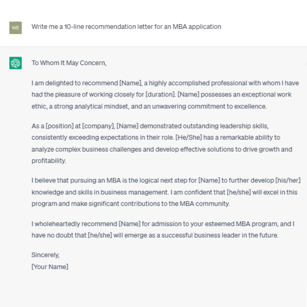The 60-Second Application Journey: When AI Moves Faster Than Hope
Wow, this was easy! A lot of my friends scared me. They were stressed with their applications, essay questions, and recommendation letters. Some even hired consultants to help them to get everything right. Now it was my turn to apply for my MBA and to be frank it was a breeze.
I signed up early to the waitlist from GPT-4 and got it right on time. I copied and pasted any questions and essay topics into GPT-4 and got reasonable answers. With some personalizations, I was done in a couple of minutes. For my recommendation letters, GPT-4 even highlighted the areas where I have to put in my details and this was the result:

As friends told me, recommenders ask the candidates to write recommendation letters and they sign off everything you present them. Even the recommendation letter wasn't a hurdle.
I have not heard back from the four institutions, but I'm confident everything will go smoothly.
Generative AI creates a lot of headaches for admissions teams worldwide:
- How to react to AI-written content in the application?
- Can candidates be rejected when using original content written by GPT-4 when it's not outlined in the Admissions Guidelines?
- Shall we even read admissions essays when the majority is using generative AI to write them?
It's not an easy time...
Here are some ideas that might help to ease the stress:
1. Widen the focus
Admissions decisions are not made based on the application alone. Besides essays, recommendations, and other application questions, there are transcripts, test scores, ad-hoc video interviews, and live interviews. They all provide sufficient details to determine the candidate's fitness for the program.
You might still consider these elements, however, change their weightage in the decision-making process.
2. Fight back with Technology
Screen all applications for AI-written content. This will help you quickly detect which applications are genuine or created by technology. Check out solutions like Turnitin. In parallel, ensure you have established policies related to AI-generated content. Without those in place, you won't be able to act against candidates using AI. Unfortunately, developing policies and getting them approved over several instances might take time. Meanwhile, students are free to choose.
Generative AI is at the beginning of the evolution curve. It will only improve the capacity to write like humans. Any AI Writing Detection Capabilities are a reaction to the evolution but never won't be ahead of the curve. So, fighting technology with technology might not be a good solution.
3. Forget Traditions
The application is a living tradition in higher education. For the past 25+ years, the most remarkable disruption has been the transition from paper-based to online applications. This impacted the format but not the content of the application. Essays, application questions, and recommendation letters remain the core of almost all applications. In a recent article, I proposed a radical change for this traditional model. This "new" way is a robust answer to GPT-4.
Maybe 2023 is an excellent time to give up traditions... There are many ways to create a different application experience:
- Adding Group Discussions,
- Adding Gamification elements
- Adding other formats to the essays and eliminating the written option.
Generative AI is not the end of the application. It forces us to re-evaluate what has been done for decades without re-thinking.
If you need help creating a new Admissions Process experience, explore our Admissions Services or reach out!

14 April 2023




